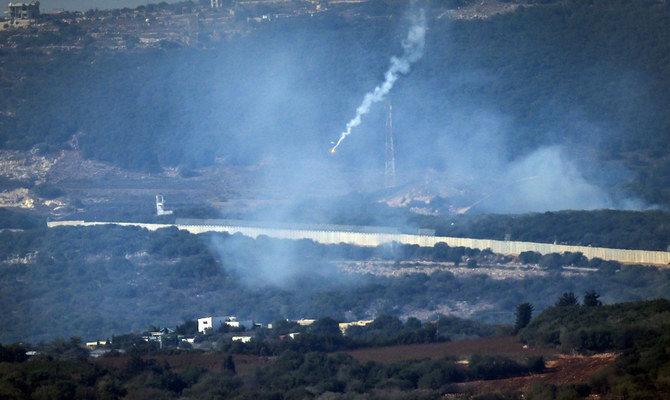
- ARAB NEWS
- 01 Jul 2025

BEIRUT: Israeli drones on Saturday fired three missiles at a site in Jabal Safi in Lebanon’s Iqlim Al-Tuffah area, about 20 km from the border demarcation line.
It was a second violation of Lebanese airspace by Israeli forces in the past 21 days amid growing tensions with Hezbollah in southern Lebanon against the backdrop of the Gaza war.
A shell also struck the perimeter fence of the UNIFIL headquarters in Naqoura, causing minor damage.
A Hezbollah surface-to-air missile fired at one of the drones was intercepted and destroyed by an Iron Dome missile.
Activists on social media platforms shared footage of the remains of a Patriot missile east of Tyre.
Last week, an Israeli drone targeted the Birket Jabbour area in Jabal Al-Rihan, north of the Litani River.
The latest exchange of fire came after the Israeli army said that it is “targeting Hezbollah infrastructure on Lebanese territory.”
Israeli reconnaissance aircraft flew over the southern border region at medium altitude.
Avichay Adraee, the Israeli army spokesperson, said that an Israeli drone targeted an armed Hezbollah cell that was trying to launch anti-tank missiles toward Hanita in northern Israel.
In southern Lebanon, Israeli forces fired more than 20 incendiary shells on the outskirts of Labbouneh in Naqoura.
Israeli phosphorus shells also set fire to areas near Alma Al-Shaab. Firefighters trying to reach the scene were forced to withdraw because of Israeli shelling.
A Lebanese medical association warned Israel against using internationally prohibited phosphorus shells, and urged authorities to take samples, especially from the skin in case of injuries, to document any abuses.
It also advised “fighters and citizens to place a wet cloth on the mouth and nose to avoid suffocation.”
The US reiterated its call for its nationals in Lebanon to leave while commercial flights remain available, “due to the unpredictable security situation.”
The US Embassy said on X: “There is no guarantee the US government will evacuate private US citizens and their family members in a crisis situation.”
A circular issued by the Lebanese Civil Aviation Authority on Friday regarding an emergency plan to evacuate the airport if necessary caused confusion among the public.
Fadi Al-Hassan, acting director-general of civil aviation, said: “The Beirut Rafic Hariri International Airport is still operating normally. As of now, two airlines have suspended their flights to Beirut, Lufthansa and Saudia, while the rest are still operating normally.”
Al-Hassan said that between 4,000 and 5,000 passengers arrive in Lebanon every day, while the number of departing passengers ranges from 6,000 to 7,000.
“The numbers are very reasonable given the current circumstances,” he said.
Caretaker Prime Minister Najib Mikati and Lebanon’s Grand Mufti Sheikh Abdul Latif Deryan met to discuss developments in the Gaza Strip.
Mikati said that “the government is engaged in diplomatic and political efforts, both regionally and internationally, to stop the Israeli aggression on southern Lebanon and Gaza.”
He said that the government has “an emergency plan to contain the repercussions of what might happen.”
Sheikh Nabil Qaouq, a member of Hezbollah’s Central Council, said that “the resistance on the ground is monitoring the aggression on Gaza.”
He added: “It is ready for all scenarios and has set up many surprises,” and warned that the US should be in no doubt about Hezbollah’s stance.
“We do not wish to reassure (the US), but rather, we want them to become increasingly concerned,” he said.